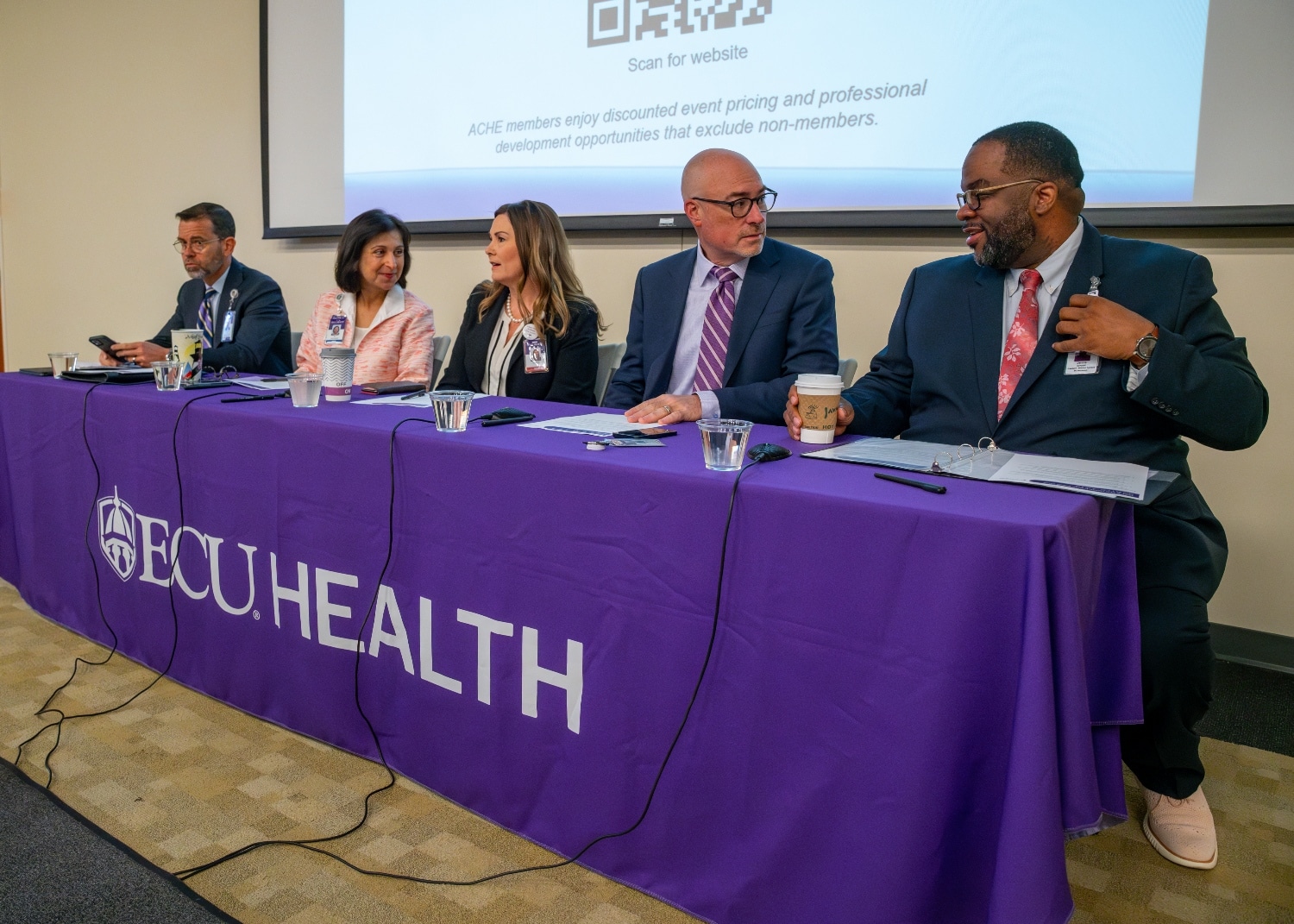ECU Health leaders, in association with Triangle Healthcare Executives’ Forum of North Carolina, recently hosted a C-Suite Round Table to discuss everything from workforce development to artificial intelligence in health care.
ECU Health Chief Operating Officer Brian Floyd, Chief Clinical Officer and Chief Quality Officer Dr. Niti Armistead, Chief Nursing Executive Trish Baise and Chief Strategy Officer Todd Hickey served on the panel for the discussion while ECU Health Beaufort Hospital President Dennis Campbell II moderated the event.
Floyd said the COVID-19 pandemic and the years that have followed created many financial challenges in health care, especially for rural hospitals and health systems like ECU Health, which already operated on thin margins.
“Most things cost less to operate in a more rural environment, except health care,” Floyd said. “By the sheer nature of us having to spread our resources so far around communities that are less densely populated, we are perfectly designed to cost more to operate than a health system of similar size in an urban environment.”

He said these circumstances made the ECU Health system come together to design improvements that help create efficiencies within the system to better serve team members, patients and families.
Talent and workforce development is a key piece to creating a more sustainable model of delivering health care in a rural community like eastern North Carolina. Baise said it’s been crucial to connect with team members and potential team members in different ways to recruit and develop high-quality nurses for the region.
“When we’re looking at cost savings, recruitment and internal programs to develop team members is a big part of that. We’re constantly evolving and looking at things differently,” Baise said. “We’re not a large metropolitan area, we don’t have significant population growth so we have to grow our own. That means academic partnerships, ensuring that we’re creating an environment that the students we’re working with will appreciate. On the back end, that also means making investments in our nurses.”
She said at the height of nurses leaving health care across the country, ECU Health experienced a 23% turnover rate of registered nurses. Thanks to the investment the system has made in nursing, the turnover rate is down to 12.6%. The investment from the system in nursing, Baise said, has gone beyond a financial investment but also includes capturing the voice of nurses, professional development and overall culture improvement.
Innovation has been a hallmark of the ECU Health story. Dr. Armistead noted that when the health system re-branded to ECU Health on Jan. 1, 2022, health care was in the midst of the Omicron variant surge from the pandemic. Dr. Armistead noted this was the most difficult month of the pandemic, one that took a toll on the health care workers tasked with treating large volumes of critically ill patients.
Through this, though, Dr. Armistead said the system has grown into an exciting, vibrant place with positivity that’s working to improve the health and well-being of eastern North Carolina.
“Aligned with our mission, we’re very community focused,” Dr. Armistead said. “That’s how we got through the pandemic, was with very strong community partnerships. Now, we’re shifting the focus of those partnerships to deal with our other challenge, which is the heavy burden of chronic disease in the region. We’re being very tactical and I’m so proud of what we’re able to do as ECU Health.”
Hickey said the work that he is most proud of is the health system’s outreach to the vulnerable populations in the 29-county region ECU Health serves.
In an area with a myriad of challenges in social determinants of health – highlighted by the fact that 21 of the 29 counties ECU Health serves are considered Tier 1 counties on the social vulnerabilities index – Hickey said partnerships make all the difference in making connections and helping community members access health care.

“Understanding that the biggest indicator of health outcomes is transportation, being able to get to an appointment, access to food, those things that we know have a much greater impact on someone’s health and health status is crucial,” Hickey said. “So we put a system in place in our community hospitals and we deliver on the promise of ensuring that we are meeting our patients where they are. I really think COVID helped drive that home in a different way, too.”
Hickey also said initiatives like the Community Health Needs Assessment are important avenues for patients to provide feedback to the health system.
The Round Table brought together leaders from around the state to hear from ECU Health and gain insight on how they are looking at shaping the future of rural health care in eastern North Carolina.